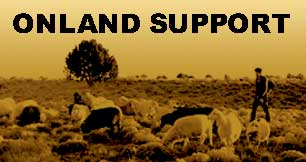Dineh travel to San Francisco to support Freedom of Religion
February 25, 2000 by pathfinder
Filed under Uncategorized
On Tuesday, February 22, 2000, forty Dineh elders and representatives
gathered at the Ninth Circuit of Appeals in San Francisco, CA for an Oral
argument in the Manybeads v. US lawsuit for Freedom of Religion. The hearing
began at 10:00 AM and two Judges were present, the third participated by
speakerphone. The Dineh and numerous supporters filled one courtroom and an
overflow courtroom equipped with a television monitor. They traveled all the
way from Black Mesa to San Francisco, knowing that they could not testify at
the hearing. They were there to demonstrate their support for the Manybeads
lawsuit. At risk is whether the case will be remanded to the Phoenix
District Court to be heard after all these years or be dismissed.
Brief History
The Manybeads v. US lawsuit was filed in 1988 on behalf of the Dineh
families that contested the relocation because it violated the religious
rights of the Dineh families. The district court rejected the case, but upon
appeal, the 9th circuit court asked the two sides to develop a mediated
solution. That solution became known as the Accommodation Agreement, under
which the Hopi would allow a limited number of 75-year leases under which
Dineh families could remain on the land. The Agreement required authorization
from Congress that was granted in the 1996 Navajo-Hopi Settlement Act. The
case has recently been returned to the 9th circuit with a number of issues
not resolved.
The US government is strongly committed to supporting this Agreement as the
resolution of a difficult and long-standing problem. Most Dineh families
strongly oppose the Agreement – the only time that it was submitted in a
public meeting, it was voted down 250-1. The government’s current solution
is to force it upon the people – the efforts made to get signatures involved
many forms of coercion and fraud. People’s firewood & livestock were
confiscated and the return tied to signing the Agreement. Some people (who
can’t read or speak English) had to sign papers for unrelated issues such as
releasing their livestock from impoundment and found out later that they had
signed the Agreement. In other communities, the rangers began a campaign of
intense harassment (stopping cars on the roads, citing people for trivial
offenses, escalating livestock confiscation’s), and then officials called a
community meeting and told residents that the harassment would end if they
all signed the Agreement. Under the 1996 Act, the Hopi get $263,000 per
signature ($25 million for 95 signatures) and since no one wanted to sign,
the motivation for pressure is clear. While the intention of the 1996 act
was to provide a mechanism to allow the people to remain on the land, the
actual impact is the opposite. It allows the Hopi Tribal government to evict
people who either do not sign the agreement or who are not eligible to sign.
The Road Trip
Our vans and truck left Black Mesa Sunday afternoon, February 20, a full
caravan on our way to San Francisco. We drove throughout the night, stopping
only to eat, gas up, and stretch our legs. Once in San Francisco, late the
next evening, we were provided welcoming accommodations by supporters in the
Oakland area. The kitchen where two neighboring houses full of people were
staying was always busy and food to prepare bountiful. There were always
stories and meals to be shared and a good amount of laughter in between the
meetings, planning, and demonstrations. We got to do some sightseeing,
driving to the highest hill in Twin Peaks sharing hot cups of coffee, then
through Golden Gate Park where people got to appreciate the beauty and
majesty of a small buffalo herd. We stopped at the ocean and braved the wind
and heavy rain to touch and greet the water. Some of the people made
offerings and prayers. We went through the Mission District and stopped to
walk down the crookest street. A light rain did not keep people from
spending a little time walking around Chinatown to visit the shops and
sights, share some fortune cookies and eat sweet black bean filled steamed
buns. On our way home, we went by way of Mike Gerrell (Clan Dyken band)
outside of Sacramento, then Poo Ha Ba, a resort with Hot Springs owned by
Corbin Harney, Western Shoshone near Las Vegas, Nevada. We spent the night
there and were fed a wonderful breakfast by members of the Shundahai Network.
Then we all spent some time in the healing waters of the Hot Springs before
leaving. Refreshed for the last leg of our journey and eagerly awaiting
HOME, we arrived back on Black Mesa late Saturday night, February 26.
Everyone was tired but felt happy and positive about the trip.
What happened at the US 9th Circuit Court of Appeals?
Dozens of Dineh and their supporters gathered outside of the 9th Circuit
Court of Appeals. There were signs; banners, drumming and a puppet show with
marionettes dangling on strings, of Hopi and Navajo tribal council officials.
At the hearing, the Dineh were represented by Attorneys Lee Phillips, Bruce
Ellison and Bob Malone before a 3 Judge panel. Attorney Kathryn Hazard
represented the US government. The Hopi Tribe made an appearance in the
proceedings, represented by their Attorney. The Navajo Tribe did not send a
representative to appear.
Attorney Lee Phillips asked the Judges to not dismiss the case and remand it
to Phoenix District Court to consider the 1996 amendment to the 1974
Relocation law and give the Dineh people an opportunity to present evidence.
Lee Phillips said he believed the Court could not make a decision about this
case until they were provided evidence and findings of fact. Therefore the
Court should remand the case to District Court to conduct hearings. This has
never happened.
Lee Phillips stated that both the Accommodation Agreement and the 1974 Act
were unconstitutional and denies the Dineh equal protection. The Dineh
subject to relocation are being treated differently because of their race and
ethnic origin, differently than all Anglos in land situations. In all cases
to the Indian Land Claims by Anglos, non-Indians keep the land and the
Indians get compensation. In other cases the US pays non-Indians money and
does not force them off their land. The role of the US government is
supposed to act as trustee of the Tribes. The Judge responded that if the
statute is ruled unconstitutional, you will succeed in throwing out the
Accommodation Agreement.
The US Government’s position was that the Hopi Tribe was an indispensable
party and is not fairly represented. Then the US Government’s position was
the Hopi Tribe is not an indispensable party. One of the Judges noted the
contradiction and told Kathryn Hazard that she is in “hot water”. The Judge
believed the position of the US government was no different than that of the
Hopi Tribe. Lee Phillips responded that the Hopi Tribe has had nine years to
join the suit on the side of the US Government.
Discussion by all parties provided no clear resolution to the number of
families subject to eviction. This concern is also shared by many Dineh that
are subject to eviction, are not eligible to sign the Agreement, and cannot
receive relocation benefits. This includes full-time residents, part-time
residents away for school or work, and those not included on any list.
Without class certification, the attorneys could not even agree on the number
of plaintiffs in the case.
Lee Phillips stated that relocation prohibits free exercise rights and the
1974 Act coerces people into entering into an Agreement that will force them
off their land or diminish their exercise of religion. The choice, don’t
sign the AA and relocate, or sign a loyalty oath to the Hopi and US
government that does not even allow the Dineh traditional burials. Lee
Phillips contended that the Dineh could not act contrary to their religion
and owe allegiance to the Creator, not man-made laws, such as those requiring
permits to cut a green branch from a tree. Any 3-permit violations in a
period of 15 years are grounds for termination.
Lee Phillips stated that the Dineh are only allowed access to grazing on ½ of
1% of the land, 360 acres out of 900,000 acres. With issues such as grazing,
burial rights and other issues of great concern yet to be resolved.
An article about the Manybeads lawsuit appeared in the Wednesday, February
23, San Francisco Chronicle and the Thursday, February 24, Navajo Times.
If; there was a way that the power of the people could melt the hearts of the
Judges, this is what happened at the 9th Circuit Court of Appeals. The
people are awaiting the outcome of the decision and pray for a good result.
The McCain Demonstration
On Thursday, February 24, about 50 people, many Dineh demonstrated outside of
the Grand Hyatt Hotel in San Francisco. The purpose of the demonstration was
to draw attention to Senator McCain’s role in sponsorship of Public Law
104-301, the Final Solution. We believe McCain cancelled his appearance at
the fundraiser after he found out that Dineh representatives were in San
Francisco, and speaking with KPFA Radio the day before and the next morning.
Bright banners and signs decorated the entrance to the Grand Hyatt and
despite the rain, supporters wore masks, led chants and displayed signs.
Rena Babbitt Lane and other representatives were interviewed by Channel 4 and
5 television that night at 11:00 PM. The segment aired focused on how McCain
was doing on the campaign trail. An article about the demonstration appeared
in the San Francisco Examiner the next day as we were leaving.
Thank you for the support that helped make this trip possible.


